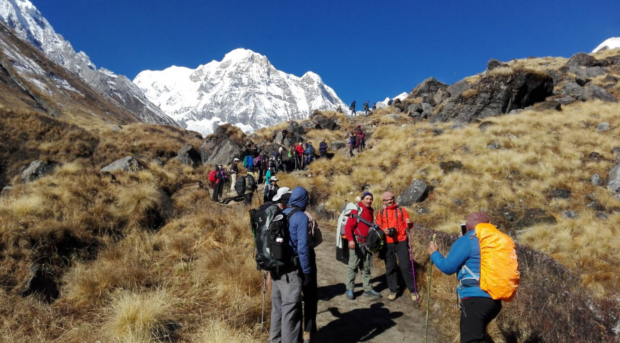Nepal orders 7-day quarantine for foreign trekkers and mountaineers
KATHMANDU — Thinking of trekking in Nepal? Be advised that there is a seven-day mandatory hotel quarantine before you will be allowed to hit the trail, and you will also need to get tested for Covid-19 at the beginning and end of the isolation period.
These are some of the requirements contained in the guidelines issued by the Tourism Ministry of Nepal on Tuesday for foreign trekkers and mountaineers who will be allowed to visit the country from October 17.
Mountaineering and trekking agencies have criticized these ‘conditional’ health safety measures, saying that this ‘harsh’ treatment towards the tourism industry would discourage travel.
On March 12, the government decided to temporarily stop issuing on-arrival tourist visas to nationals of all countries, and cancel spring mountaineering expeditions including Everest missions. The decision came a day after the World Health Organization declared the COVID-19 outbreak a pandemic and urged countries to take precautionary measures.
The government stopped international flights from March 20 and put the country under a lockdown from March 24. The stay-home order was lifted on July 21, with some of the restrictions still in place. Bowing to pressure, the government decided to allow foreigners to participate in trekking and mountaineering activities to revive the country’s tourism industry hit hard by the Covid-19 pandemic.
Article continues after this advertisement“We have opened, but only for trekkers and mountaineers. Tourists intending to come for other purposes like leisure and pilgrimage will not be allowed for the time being,” said Kamal Prasad Bhattarai, spokesperson for the Tourism Ministry.
Article continues after this advertisement“The government has taken the move quite cautiously amid the Covid -19 pandemic to allow foreigners to visit Nepal’s mountain regions.”
Travelers have to secure visas before they arrive in Nepal. This means the government will not issue on-arrival visas at Tribhuvan International Airport like before.
Would-be visitors who are unable to secure visas through the Nepal embassies and diplomatic mission abroad should make a prior request through their trekking or travel agencies in Nepal.
In such cases, the Department of Tourism that issues mountaineering permits, and the Nepal Tourism Board that issues trekking permits, will recommend to the Department of Immigration to issue visas to the applicants.
On the basis of such a recommendation, the Department of Immigration will make arrangements for visas at the immigration entry point or the place of departure.
Travelers need to submit various paperwork at the entry point to get their visas.
The documents required are a negative polymerase chain reaction (PCR) test report not older than 72 hours, documents that were issued from Nepal for visas, documents proving they hold advance hotel booking for at least seven days, and Covid-19 related insurance documents with a coverage of $5,000 per person.
The guidelines say that travelers having all these documents will be granted visas, and they will have to spend at least seven days in hotel quarantine.
After the quarantine period, travelers have to undergo another PCR test at their own expense; and if the test report is negative, they will be allowed to proceed to their respective destinations in the mountain region.
Travellers testing positive will have to remain in hotel quarantine until their next test results come back negative.
Trekkers and mountaineers have to insure their travel guides for Rs100,000. As per the government’s rule, guides are mandatory for all trekkers and mountaineers.
Khum Bahadur Subedi, president of the Trekking Agencies Association of Nepal, described the guidelines as being ‘harsh’ which would discourage travellers from visiting Nepal.
“The way tourists are required to obtain visas is full of hassles. It’s like collecting a tonne of documents to travel,” he said. “Even after the visa is issued, the quarantine provision is more harsh,” he said, adding that tourists come to visit Nepal, not to stay in hotel quarantine.
According to Subedi, in many countries that have reopened their tourism, travellers have to undertake a polymerase chain reaction test at the airport on arrival.
“If we can set up a dedicated PCR test center at the airport and produce reports within a couple of hours, quarantine obligations can be avoided,” he said.
Subedi said the PCR test centre would work for a long time as no one knows when a vaccine will be ready, and visitors will come in droves. “Until then, we have to build up the confidence of tourists.”
He added that they had asked the government to review some strict provisions in the guidelines
As various agencies have complained that the government is discouraging the entry of tourists by enforcing strict measures, necessary amendments could be made to the provisions if the private sector comes up with suggestions to ease the process, Tourism Ministry spokesperson Bhattarai said.
In 2018, Nepal’s tourism sector generated Rs240.7 billion in revenue, which is almost 8 percent of the GDP; and supported, directly or indirectly, more than 1.05 million jobs, according to the annual World Travel and Tourism Council report.
For more news about the novel coronavirus click here.
What you need to know about Coronavirus.
For more information on COVID-19, call the DOH Hotline: (02) 86517800 local 1149/1150.
The Inquirer Foundation supports our healthcare frontliners and is still accepting cash donations to be deposited at Banco de Oro (BDO) current account #007960018860 or donate through PayMaya using this link.
